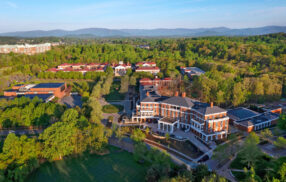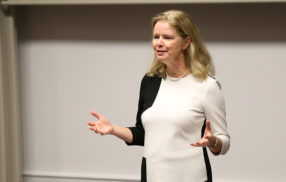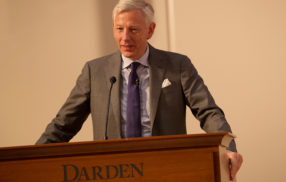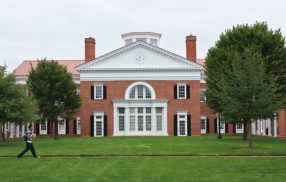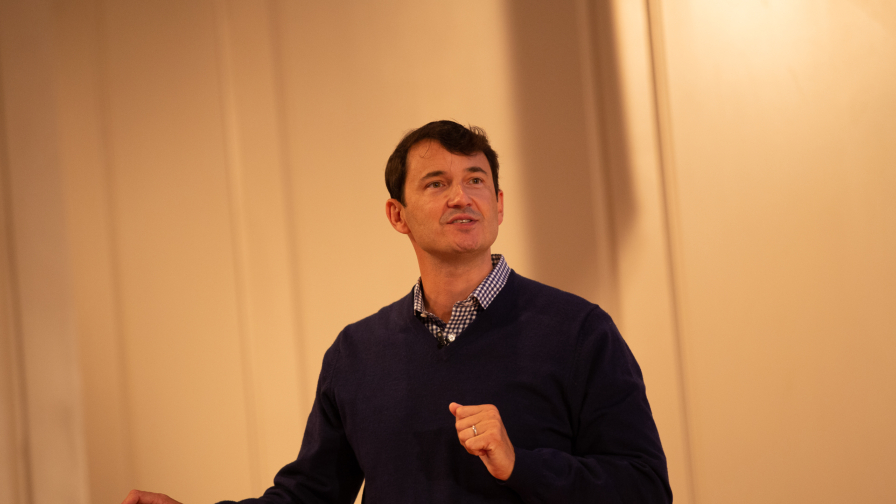
How One Iconic Retailer Is Changing Amid an Industry Transformation
By Dave Hendrick
Hal Lawton’s (MBA ’00) post-college career journey began in a paper mill in rural North Carolina, where he wore steel-toed boots and safety goggles and measured the day’s success in tons of paper made.
It was also where he first ran into the limitations of his current understanding of finance and how to run a business.
Lawton’s perceived shortcomings led him to the University of Virginia Darden School of Business, then McKinsey & Co., and ultimately to top jobs at iconic retail giants Home Depot, eBay and now Macy’s, where he has served as president since September 2017.
“The way I think about my career, there are two key themes — intellectual curiosity and the desire to learn,” Lawton told Darden students at a Leadership Speaker Series address.
Lawton recounted his initial post-Darden career at McKinsey, where he fed his curiosity but said he naively assumed someone would eventually simply hand him the keys to operate a business.
The reality was instead brought home by a corporate recruiter, who told Lawton: “People hire you to do to the job they know you can do, not the job you hope you can do.”
Aspiring to truly learn to run a business, Lawton moved to Home Depot for 10 years, progressing from business development to finance to the then-nascent online category, and eventually to the head of the company’s marquee tools, hardware and power equipment merchandise division.
His decade of experience made him an ideal candidate for eBay as the e-commerce pioneer looked to expand its connections to traditional retail, and Lawton spent more than two years in the San Francisco Bay Area as senior vice president at the company before Macy’s came calling in 2017.
Although Lawton said Macy’s had long been on a shortlist of companies he admired enough to consider working for, given attributes like a strong brand identity, scale and solid financial footing, the potential move came at a time when sentiment around the overall retail industry was not strong, with once storied brands collapsing and many traditional shopping malls shuttering.
While Macy’s had a strong balance sheet and scale across its stores, digital and vendor base, the company was coming off 10 straight quarters of negative year-over-year growth and the phrase “retail apocalypse” was a regular occurrence in business news media. Still, Lawton said he found a management team “aligned on a commitment to transform the business and getting back to growth.”
The company’s initial turnaround efforts have included significant investments in both the physical stores, Macys.com and the company’s mobile app. Lawton said the company significantly reinvested in the business across a footprint of stores, improving everything from lighting to products, while also adding more food and beverage options such as Starbucks.
The company has also added new experiences like Macy’s branded off-price stores, Backstage, in over 100 locations and virtual reality capabilities in their home department. Lawton said the company also invested heavily in talent to improve the shopping experience, hiring style consultants to help customers shop, for instance.
Online has seen a similar refresh, offering a more personalized and curated shopping experience while also adding more product offerings, many sold on a “vendor-direct” basis, allowing Macy’s to offer an endless aisle to the customer.
Still, Lawton said the tangible enhancements meant little without the ability to “rally the colleague base” for total alignment around strategy.
“Ultimately as a leader, you are really serving your colleagues,” Lawton said. “I truly believe that as an executive, if we take care of our colleagues, they are going to take care of the customers, and everything else is going to take care of itself.”
The various efforts have shown signs of strength, with Macy’s reporting three straight quarters of positive year-over-year comparable sales
The University of Virginia Darden School of Business prepares responsible global leaders through unparalleled transformational learning experiences. Darden’s graduate degree programs (MBA, MSBA and Ph.D.) and Executive Education & Lifelong Learning programs offered by the Darden School Foundation set the stage for a lifetime of career advancement and impact. Darden’s top-ranked faculty, renowned for teaching excellence, inspires and shapes modern business leadership worldwide through research, thought leadership and business publishing. Darden has Grounds in Charlottesville, Virginia, and the Washington, D.C., area and a global community that includes 18,000 alumni in 90 countries. Darden was established in 1955 at the University of Virginia, a top public university founded by Thomas Jefferson in 1819 in Charlottesville, Virginia.
Press Contact
Molly Mitchell
Associate Director of Content Marketing and Social Media
Darden School of Business
University of Virginia
MitchellM@darden.virginia.edu



